Our memories are fundamental to who we are. All our knowledge and all our skills and other abilities reside in memory. As a consequence so do all our: beliefs; tastes; loves; hates; hopes; and fears.
Yet our memories are neither permanent nor unchangeable and this has many consequences. Not the least of these is the bearing memory has on our truthfulness.
According to the Macquarie Dictionary a lie is: "a false statement made with intent to deceive; an intentional untruth; a falsehood - something intended or serving to convey a false impression". So when we remember something that didn't happen, perhaps from a dream or a suggestion made by someone else, or we forget something that did happen, we are not lying when we falsely assert that it happened or truthfully deny it.
The alarming thing is that this may happen quite frequently without our noticing. Mostly this is trivial but when it contradicts someone else's recollections, in a way that has serious legal or social implications, it can change lives or become front page news.
Some time ago I was motivated, by the controversy surrounding the United States Senate hearing into the appointment of Judge Brett Kavanaugh to the US Supreme Court, to write a cautionary note along these lines. During the hearings it was alleged, by a very credible witness, Dr Christine Blasey Ford, that Kavanaugh had sexually assaulted her when they were both in their teens.
I did not particularly want to see Kavanaugh appointed but felt that this allegation, of itself, was not sufficient grounds to deny his suitability. I argued that after such a long time we should be respecting his right to be presumed innocent, unless there was contemporary immutable evidence (diaries or photographs perhaps) or testimony from other, non-colluding, girls who had suffered a similar assault.
Then in 2018 in Australia, Cardinal George Pell, was convicted of an historical sexual assault. Again there was just one, apparently very credible, accuser. The alleged victim persuaded over twenty jurors, in two separate trials, that his account was true, while Pell of course, denied it.
Although, like Kavanaugh, Cardinal Pell was not one of my favourite people, I questioned the soundness of the conviction, writing: "I'm just a little concerned about the historical nature of the charges". Almost everyone I know disagreed with me.
At the time, a number of historical accusations of a similar kind had surfaced against Pell and there was the worldwide revulsion (see my Ireland Travel Notes) against the many sexual crimes committed within the Roman Catholic Church, such that a Cardinal was likely to be disbelieved, just as at one time a choir boy's accusations against a priest would have been, and were, dismissed.
Eventually Cardinal Pell's appeal reached the High Court of Australia, where the conviction was quickly overturned on the grounds that 'reasonable doubt' had not been respected. But in the meantime he'd spent 13 months in jail and lost his job at the Vatican.
Now the Democratic Candidate for the 2020 US Presidential election, Joe Biden, has been accused of an historical sexual assault by a onetime staffer, Tara Reade.
In 2019 Tara Reade told the media that when she worked in his Senate office back in 1993, Biden made her uncomfortable by touching her neck, shoulders and hair. When it was conceded that thirty years ago Biden did rub people's shoulders, irrespective of gender, until someone suggested that it was not appropriate, Reade responded that in her case the touching was not simply platonic because in addition Biden had once backed her against a wall and put his fingers into her.
Biden absolutely denies this. And while one accusation of this sort usually results in a string of similar accusations, no other woman has come forward with similar claims against Biden.
Yet neither Tara Reade nor Joe Biden may be lying if each is genuinely reporting their true recollection of that time nearly thirty years ago. So if there was no witness nor material evidence, as Bishop Berkley might have asserted: the event no longer exists, even if it once did.
How reliable is anyone's memory?
In a famous experiment, conducted by Elizabeth Loftus FRSE and recently recalled by Dr Karl on the ABC, volunteer subjects who had all been to Disneyland as children, were falsely encouraged to imagine seeing someone there in an encounter with one of those oversized yet loveable characters: Daffy Duck. A year later a significant proportion of the subjects had a certain recollection of themselves encountering Daffy there. Yet Daffy belongs to Warner Brothers and has never been at Disneyland where Donald Duck reigns supreme. In the following TED talk Elizabeth Loftus provides many more examples of false memories.
|
|
| No responsibility is accepted for linked third party video or media content - see Terms of Use and Copyright. You follow any YouTube links or advertisements displayed at your own risk. |
I too once believed that I have an excellent memory. For example, I can tell you a great deal about the photo below of me learning dressage, I can even 'feel' what it was like, with my right foot too far into the stirrup, or about those even earlier photos below:
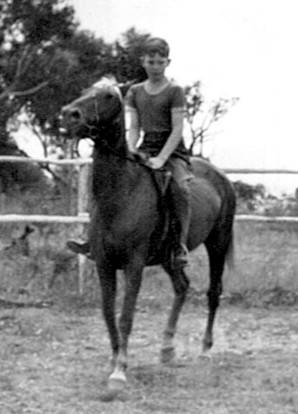 |
|
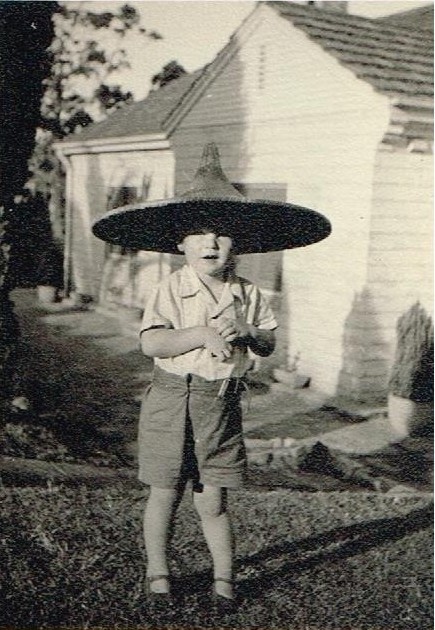 |
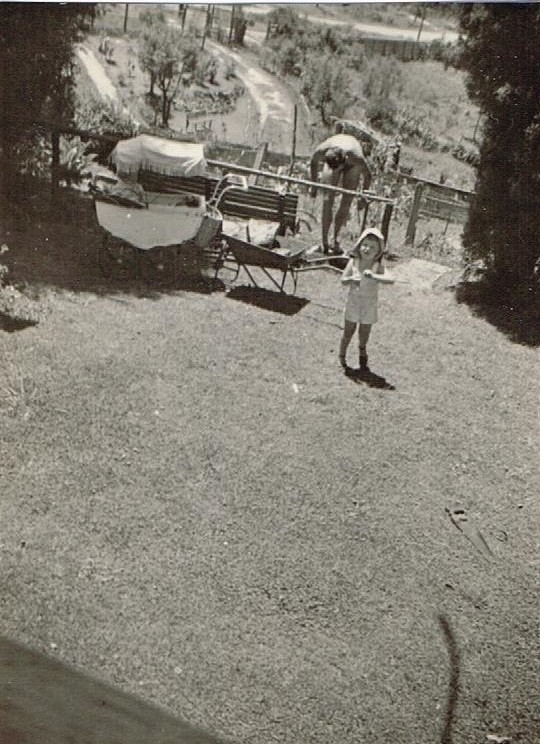 |
When I found them in an old album as an adult they held few surprises for me, except that I thought Peter's pram was black, otherwise I could confidently walk around the house in my memory describing everything as I went.
They were taken at 317 Pennant Hills Road Thornleigh NSW Australia in 1948-49, when I was three or four years old and I can clearly recall some things that are specific to the time and place the photos were taken, like: what was growing in the vegetable garden down the sandstone terraces, behind my father; and where that hat was kept. Or at least my memory persuades me I can. It seems as clear to me as yesterday.
Yet would my parents agree with me if they were alive? My own children have a different version of their young lives to the one I remember. Perhaps we focused on different things?
The problem is that children can't actually remember much from when they were three or four. It's called infantile amnesia. I can remember a lot about the photos because we went on to live in that house for another 14 years and I'm filling out and editing my memories with more recent ones. So now I have a probably fictitious but totally believable 'story' of what was taking place. I can even add the sounds of an old push grass mower; cicadas singing; the smell of cut grass; and of my mother baking scones. Or maybe I've just remembered something terrible that explains my life later on?
Elsewhere on this website I've engaged in nostalgia about times like Empire Day (bonfire night). Could I have re-remembered some of this too? Nostalgia isn't what it used to be.
My doubts about my own 'certain' memories began a couple of decades ago.
In the early 1970’s I spent some years in London and lived and worked within cycling distance of the Tate Art Gallery (now Tate Britain), a favourite place for contemplation that I visited quite frequently.
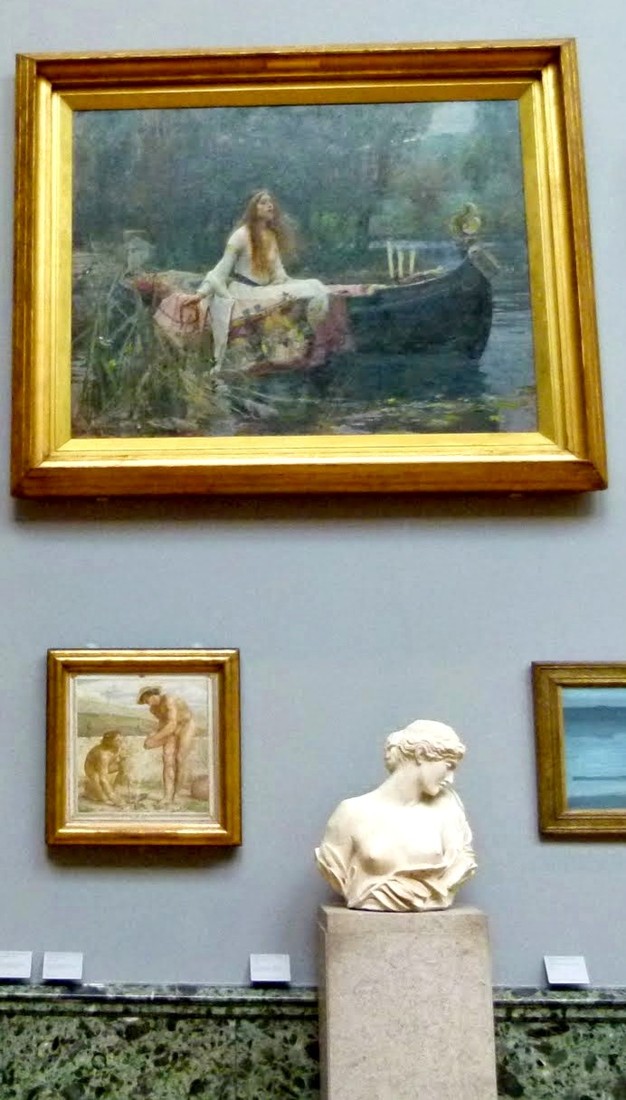 |
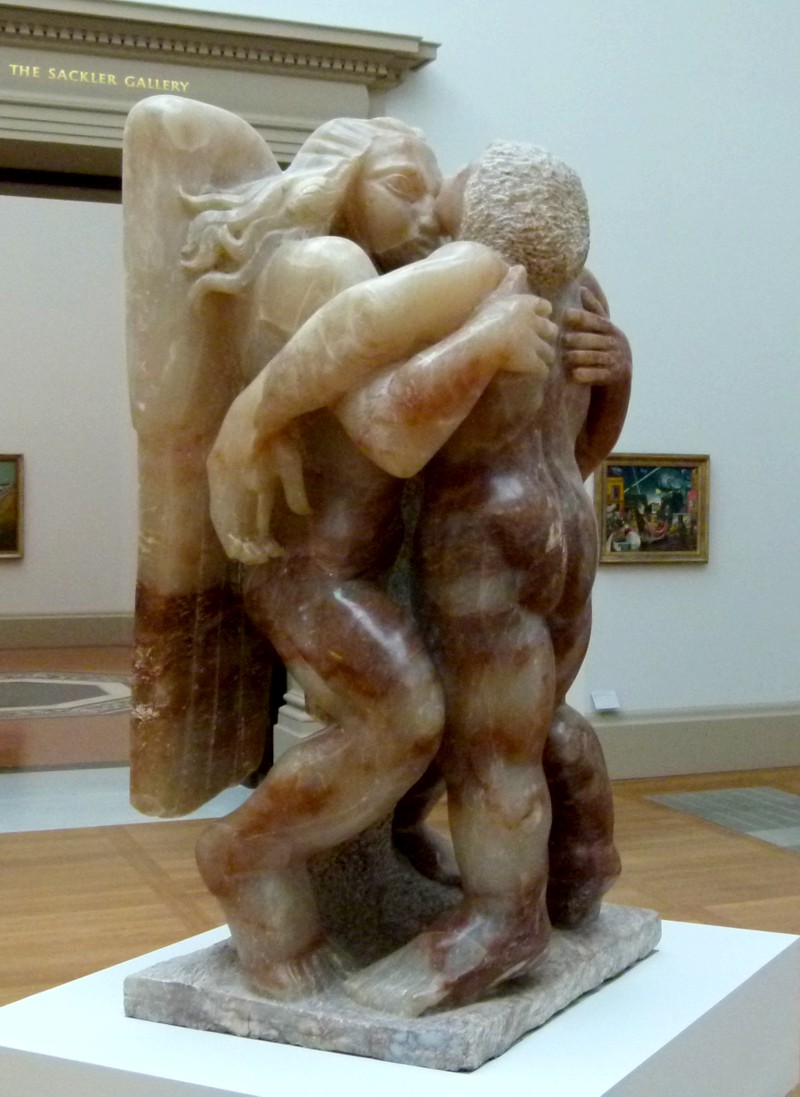 |
The Tate houses many familiar objects like:
- A painting: The Lady of Shalott by the Pre-Raphaelite painter John William Waterhouse, illustrating the Romantic Poet: Alfred, Lord Tennyson's Idylls of the King, that brings back a flood of related memories:
Lying, robed in snowy white
That loosely flew to left and right—
The leaves upon her falling light—
Thro' the noises of the night
She floated down to Camelot:
And as the boat-head wound along
The willowy hills and fields among,
They heard her singing her last song,
The Lady of Shalott. -
A sculpture: Jacob and the Angel, referencing a somewhat obscure Biblical allegory about Jacob's struggle with God, in the form of an angel, who leaves him partially lame. It's by Jacob Epstein and it's a very substantial and, given the material, a very costly endeavour that must have taken a very long time to make, while all the while attempting to shape his own existential struggle. Deep and meaningful. Yet it always makes me smile as it recalls a probably unfair but delightfully frivolous limerick:
| There's a wonderful family named Stein; There's Gert and there's Ep and there's Ein; Gert's poetry's bunk; Ep's sculpture is junk; and no one can understand Ein. |
Like many familiar museums the Tate houses other such images and objects, that, like photographs, have the power to recover their related memories.
Around twenty years after I lived there I was in London again and decided to revisit the Tate. Confidently walking along The Embankment to its location I was amazed. The Tate had disappeared! After asking someone I found it again, several hundred metres away, but I was absolutely convinced that they’d moved it to a different building. I even questioned the people at the reception as to when this had happened.
Of course it hadn’t moved, it's been in the same place since 1897. It was my clear and certain memory of the London I knew that had subtly changed; and not just at that point.
From that moment on I became a little less inclined to insist that my memories, while generally reliable, are always an immutable record of past events. Now the best I can say is that: 'on the whole my memory is reasonably good'. I had no difficulty finding the Tate again last year.
Of course even in childhood I’d noticed that others I’d shared an experience with had a slightly different version of what happened. On a school outing friends would notice different things and even ascribe different meanings or reactions, like fear; joy or surprise, to those events.
That people experience the same event differently exercises psychiatrists dealing with Post Traumatic Stress on a daily basis and as a theme it has a long literary tradition. For example it’s the basis of Akira Kurosawa's classic film Rashômon and several later movies. In that case the report of the killing changed according to the witnesses prejudices, desires and biases.
So this too masks the tricks our memory plays on us over time. We can’t rely on others to provide confirmation of our memory of an event immediately after the event, let alone decades later.
Everyone's memory is fluid, changing subtly over time.
It’s obvious to everyone that we change physically as we age. None of us has the same body we did a decade ago. And when we suffer injuries or disease healing leaves us a little different, perhaps with a scar or a limp. A mature adult loses and recreates about 60 billion replacement cells every day. So in ten or twenty years almost every cell in our body has been progressively replaced. We are like a corporation in which every staff member has changed.
It was once thought that brain cells, neurons, must be the exception. Else how is memory and thus knowledge; belief and skill preserved? But it seems that these cells too die and are replaced, with the previous connections and their switches more or less reinstated, almost perfectly. Yet it was small imperfections in these reconnections in my brain that lead to the disappearance of the Tate.
Philosophers and scientists talk about the ‘illusion of the self’ and I’ve discussed this at length elsewhere on this website so I won’t reprise it yet again.
Suffice it to say that the beliefs we hold the abilities we have and the knowledge, experiences and behaviours we have learned and accumulated are all stored in our brains, by our neurons as strings of connections between their synapses.
Thus learning a new skill causes our brain to grow in the relevant area. Even in old age many can learn new skills or recover from brain damage, like a stroke.
Today people live longer that they once did. So it's more apparent to everyone, that when they suffer memory loss, our acquaintances and loved ones cease to be the person they once were. When half a century was a long life this was relatively rare and it was thought, like madness, to be due to possession by the Devil. A priest would be called. Now we know it's due to damage to functional memory, as encoded in the relationships between connections in their brain and medical research aimed at mitigating dementia is concentrated on repairing or preventing such damage.
Even a healthy brain is changing all the time yet we don't notice small changes in our memory because it's its own principal reference. So we're inclined to believe our memories are a true record, even when contradicted by irrefutable physical evidence. The pram was cream!
While changes to our brain and the replacement of all our cells make us into a new person over time, this should not be a 'get out of jail card' for past crimes and misdemeanours, any more than asserting that we were under the influence of a drug when the crime was committed. But it should make us cautious about accepting anyone's distant memories as totally reliable, unless there is immutable or at least independent verification.

